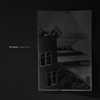Tim Hecker, "Dropped Pianos"
 This companion release to this year's stellar Ravedeath, 1972 draws back the curtain to unveil what Tim Hecker compositions sound like before they are properly ravaged, carved up, and reassembled.  As it turns out, they still sound remarkably good: some depth and power is understandably lost, but the increased clarity and intimacy makes that seem like a perfectly acceptable sacrifice.  Naturally, the target audience for Dropped Pianos is primarily those who already know and love Hecker's work, but these stripped-down piano sketches are strong enough to transcend their skeletal status and stand on their own.
This companion release to this year's stellar Ravedeath, 1972 draws back the curtain to unveil what Tim Hecker compositions sound like before they are properly ravaged, carved up, and reassembled.  As it turns out, they still sound remarkably good: some depth and power is understandably lost, but the increased clarity and intimacy makes that seem like a perfectly acceptable sacrifice.  Naturally, the target audience for Dropped Pianos is primarily those who already know and love Hecker's work, but these stripped-down piano sketches are strong enough to transcend their skeletal status and stand on their own.
I don't know quite what I expected from this album, but I can honestly say that it never occurred to me that Tim Hecker had already composed a number of sublime piano compositions before he and Ben Frost ever set foot in that Reykjavik cathedral to start recording.  I am well aware that Tim Hecker albums feature actual instruments and that they have to originate somewhere, but he is just not the sort of artist that I ever pictured frowning in front of a piano, struggling to find the right chord.  I was also struck by the amount of assurance, drive, and destruction that must have been required to make Ravedeath.  While some of these sketches can be recognized in drastically altered form on the finished album (like "Sketch 2" in "Piano Drop," I think), quite a few cannot.  It seems so alien to me that someone can create a shimmeringly beautiful piano miniature like "Sketch Three," then cheerfully tear it apart, bury it, or opt not to use it all.  Most people would have stopped at that stage and been very happy, but Hecker just saw it as a mere starting point.  I'm glad he knew what he was doing.
Once I was done obsessing about Hecker's creative process, however, I still found quite a bit to like.  It wouldn't be far from the mark to say that Dropped Pianos sounds like Harold Budd covering a Tim Hecker album, as these pieces are very minimal, slow-moving, and slathered with reverb (there is still conspicuous processing here, just not anywhere near as much as usual).  Such a glib statement would be a bit a disservice though, as this still sounds distinctly Hecker-esque: it just happens to be a fragile, pure, and almost sacred-sounding side of his art that has previously been well-hidden by his brilliance as a producer.  In fact, those restless urges to ruin, obscure, and texturize everything actually resurface in the swelling and lurching final sketch, as the piano is increasingly enveloped by distortion and sizzle as it progresses.  The added processing doesn't necessarily make it any stronger than the other pieces, but it brings some welcome variety and unpredictability to the album and reminds me exactly who I am listening to.
I'm pretty thrilled that Hecker decided to make these recordings available, as these pieces are too quietly beautiful to only be heard in corroded and mangled form.  This is a very likable album and I suspect I'll be listening to it again many times in the future.  Also, I think it definitely deepened my appreciation for what Hecker does and how he goes about doing it.  That said, I readily concede that Tim's original instincts regarding this material were correct: Dropped Pianos is a pleasant and elucidating diversion, but it is nowhere near as satisfying as his more complex finished work.
Samples can be found here.




